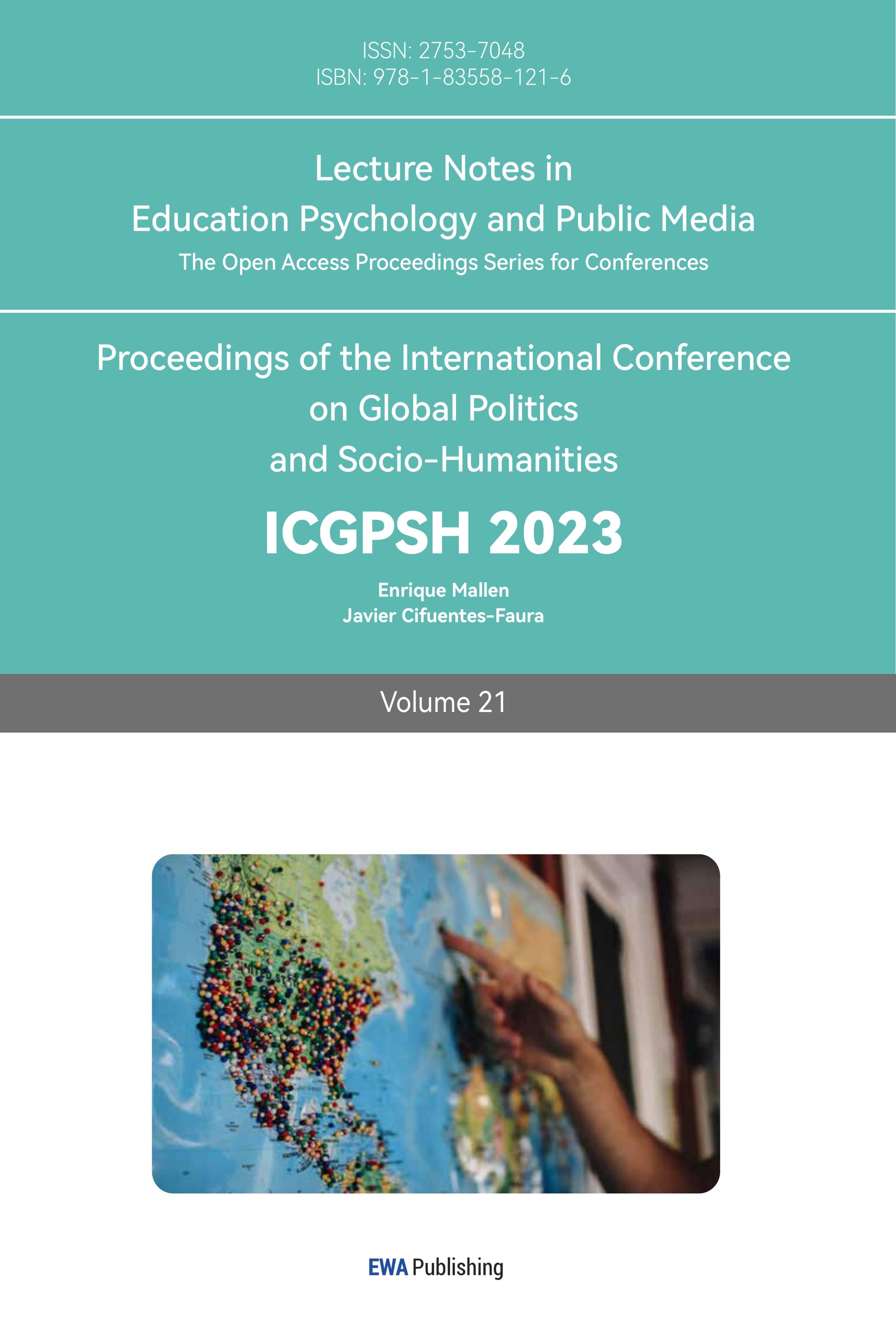References
[1]. Reuter, O. J., and Robertson, G. B. (2015) Legislatures, cooptation, and social protest in contemporary authoritarian regimes. The Journal of Politics, 77, 235–248.
[2]. Krol, G. (2017) Legislative performance of the Russian State Duma: The role of parliament in an authoritarian regime. East European Politics, 33, 450–471.
[3]. Shirikov, A. (2021) Who gets ahead in authoritarian parliaments? the case of the Russian state duma. The Journal of Legislative Studies, 28, 554–577.
[4]. Ledyaev, V., Chirickova, A., and Seltser, D. (2014) Who governs? power in the local Russian community. Journal of Political Power, 7, 211–231.
[5]. Krol, G. (2021) The legislative role of the Russian Duma and the Kazakh Mazhilis: Authoritarianism and power sharing in post-Soviet eurasia. Post-Soviet Affairs, 37, 559–577.
[6]. Sakwa, R. (2021) Russian Politics and Society. Abingdon, Oxon: Routledge, Taylor & Francis Group.
[7]. Szelenyi, I. (2015) ‘Weber’s theory of domination and post-communist Capitalisms’, Theory and Society, 45, pp. 1–24.
[8]. Teague, E. (2020) Russia’s constitutional reforms of 2020. Russian Politics, 5, 301–328.
[9]. Kynev, A. (2017) How the electoral policy of the Russian state predetermined the results of the 2016 State Duma elections. Russian Politics, 2, 206–226.
[10]. Engström, M. (2014) Contemporary Russian messianism and new Russian foreign policy. Contemporary Security Policy, 35, 356–379.
[11]. Petrov, K., and Gel’man, V. (2019) Do elites matter in Russian foreign policy? the gap between self-perception and influence. Post-Soviet Affairs, 35, 450–460.
[12]. Gvosdev, N. K., and Marsh, C. (2014) Russian foreign policy: Interests, vectors, and sectors. Washington, DC: CQ Press, an Imprint of SAGE Publications, Inc.
[13]. Laruelle, M. (2015) Russia as a “divided nation,” from compatriots to Crimea: A Contribution to the discussion on nationalism and foreign policy. Problems of Post-Communism, 62, 88–97.
[14]. Panov, P., and Ross, C. (2013) Sub-national elections in Russia: Variations in United Russia’s domination of regional assemblies. Europe-Asia Studies, 65, 737-752.
[15]. Balynskaya, N. R., and Koptyakova, S. V. (2015) Influence of election legislation alteration on civil society development Russian practice. European Journal of Science and Theology, 11, 219.
Cite this article
Shang,H. (2023). Exploring the Role of Duma in the Power Structure of Contemporary Russia. Lecture Notes in Education Psychology and Public Media,21,87-93.
Data availability
The datasets used and/or analyzed during the current study will be available from the authors upon reasonable request.
Disclaimer/Publisher's Note
The statements, opinions and data contained in all publications are solely those of the individual author(s) and contributor(s) and not of EWA Publishing and/or the editor(s). EWA Publishing and/or the editor(s) disclaim responsibility for any injury to people or property resulting from any ideas, methods, instructions or products referred to in the content.
About volume
Volume title: Proceedings of the International Conference on Global Politics and Socio-Humanities
© 2024 by the author(s). Licensee EWA Publishing, Oxford, UK. This article is an open access article distributed under the terms and
conditions of the Creative Commons Attribution (CC BY) license. Authors who
publish this series agree to the following terms:
1. Authors retain copyright and grant the series right of first publication with the work simultaneously licensed under a Creative Commons
Attribution License that allows others to share the work with an acknowledgment of the work's authorship and initial publication in this
series.
2. Authors are able to enter into separate, additional contractual arrangements for the non-exclusive distribution of the series's published
version of the work (e.g., post it to an institutional repository or publish it in a book), with an acknowledgment of its initial
publication in this series.
3. Authors are permitted and encouraged to post their work online (e.g., in institutional repositories or on their website) prior to and
during the submission process, as it can lead to productive exchanges, as well as earlier and greater citation of published work (See
Open access policy for details).
References
[1]. Reuter, O. J., and Robertson, G. B. (2015) Legislatures, cooptation, and social protest in contemporary authoritarian regimes. The Journal of Politics, 77, 235–248.
[2]. Krol, G. (2017) Legislative performance of the Russian State Duma: The role of parliament in an authoritarian regime. East European Politics, 33, 450–471.
[3]. Shirikov, A. (2021) Who gets ahead in authoritarian parliaments? the case of the Russian state duma. The Journal of Legislative Studies, 28, 554–577.
[4]. Ledyaev, V., Chirickova, A., and Seltser, D. (2014) Who governs? power in the local Russian community. Journal of Political Power, 7, 211–231.
[5]. Krol, G. (2021) The legislative role of the Russian Duma and the Kazakh Mazhilis: Authoritarianism and power sharing in post-Soviet eurasia. Post-Soviet Affairs, 37, 559–577.
[6]. Sakwa, R. (2021) Russian Politics and Society. Abingdon, Oxon: Routledge, Taylor & Francis Group.
[7]. Szelenyi, I. (2015) ‘Weber’s theory of domination and post-communist Capitalisms’, Theory and Society, 45, pp. 1–24.
[8]. Teague, E. (2020) Russia’s constitutional reforms of 2020. Russian Politics, 5, 301–328.
[9]. Kynev, A. (2017) How the electoral policy of the Russian state predetermined the results of the 2016 State Duma elections. Russian Politics, 2, 206–226.
[10]. Engström, M. (2014) Contemporary Russian messianism and new Russian foreign policy. Contemporary Security Policy, 35, 356–379.
[11]. Petrov, K., and Gel’man, V. (2019) Do elites matter in Russian foreign policy? the gap between self-perception and influence. Post-Soviet Affairs, 35, 450–460.
[12]. Gvosdev, N. K., and Marsh, C. (2014) Russian foreign policy: Interests, vectors, and sectors. Washington, DC: CQ Press, an Imprint of SAGE Publications, Inc.
[13]. Laruelle, M. (2015) Russia as a “divided nation,” from compatriots to Crimea: A Contribution to the discussion on nationalism and foreign policy. Problems of Post-Communism, 62, 88–97.
[14]. Panov, P., and Ross, C. (2013) Sub-national elections in Russia: Variations in United Russia’s domination of regional assemblies. Europe-Asia Studies, 65, 737-752.
[15]. Balynskaya, N. R., and Koptyakova, S. V. (2015) Influence of election legislation alteration on civil society development Russian practice. European Journal of Science and Theology, 11, 219.









